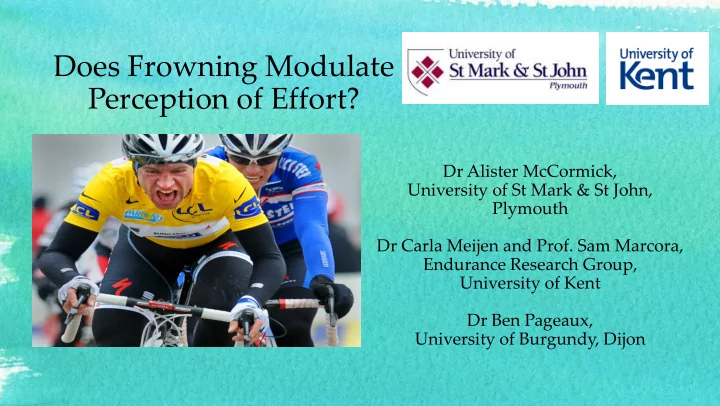

Does Frowning Modulate Perception of Effort? Dr Alister McCormick, University of St Mark & St John, Plymouth Dr Carla Meijen and Prof. Sam Marcora, Endurance Research Group, University of Kent Dr Ben Pageaux, University of Burgundy, Dijon
Introduction • People frown when they experience high effort. • Could frowning be a determinant of perceived effort?
Introduction • Research on the facial feedback hypothesis shows that facial expressions can amplify or soften elicited feeling states. • If frowning influences perception of effort, then interventions that target frowning could be used to improve endurance performance.
Study Aims • The facial feedback hypothesis and the psychobiological model of endurance performance were applied. • We examined whether intentionally frowning during a cycling time-to-exhaustion test increased perception of effort and, consequently, reduced time to exhaustion. Does frowning amplify perceived effort? • We also examined the effects of frowning on affective states experienced while cycling and after exhaustion.
Methods • Ten endurance athletes performed time-to- exhaustion tests in three conditions. • In one condition, participants frowned throughout the time-to-exhaustion test. There were two control conditions. • Electromyography biofeedback was used to deliver interventions. • Perception of effort (RPE) and exercise- related affect (Feeling Scale) were measured throughout the time-to-exhaustion test.
Manipulation Checks
Effects During Performance
Results Summary • Time to exhaustion was similar in the frowning (609 ± 243s) and no-intervention conditions (603 ± 175s), and it was shorter in the thumb-press condition (558 ± 159s) ( p = .58). • Intentionally frowning did not affect perception of effort, affective states experienced while cycling or after exhaustion, or time to exhaustion.
Discussion • The findings suggest that frowning may not modulate perception of effort during endurance performance. • The results are not promising for frowning-based performance-enhancing interventions informed by the facial feedback hypothesis. • Future research that examines the effects of inhibiting frowning could offer greater clarity.
Any Questions? Dr Alister McCormick, University of St Mark & St John, Plymouth Dr Carla Meijen and Prof. Sam Marcora, Endurance Research Group, University of Kent Dr Ben Pageaux, University of Burgundy, Dijon
Recommend
More recommend